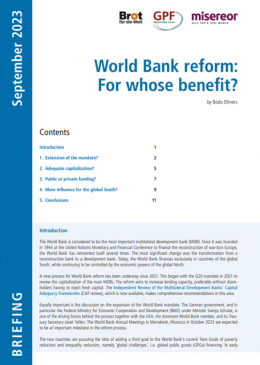The World Bank is considered to be the most important multilateral development bank (MDB). Since it was founded in 1944 at the United Nations Monetary and Financial Conference to finance the reconstruction of war-torn Europe, it has reinvented itself several times. The most significant change was the transformation from a reconstruction bank to a development bank. Today, the World Bank finances exclusively in countries of the global South, while continuing to be controlled by the economic powers of the global North.
A new process for World Bank reform has been underway since 2021. This began with the G20 mandate to review the capitalization of the main MDBs. The reform aims to increase lending capacity, preferably without shareholders having to inject fresh capital. Equally important is the discussion on the expansion of the World Bank mandate. Germany and the USA are the driving forces behind the process. The two countries are pursuing the idea of adding a third goal to the World Bank’s current Twin Goals of poverty reduction and inequality reduction, namely ‘global challenges’, i. e. global public goods (GPGs) financing.
Other stakeholders have mixed feelings about this vision. In countries where the World Bank actually operates, fears are being expressed that an expansion of the mandate could overstretch the World Bank, diverting scarce resources from its traditional core development finance tasks. This comes at a time when multiple crises have increased funding needs for their national development priorities even beyond expectations. In general, the borrower countries see greater need for reform in lending capacity and terms, and in World Bank governance. The latter is aimed at giving them more voice and decision-making power in the governance bodies.
Many civil society organizations (CSOs) have also expressed their views on the subject. They are positive in principle about a more ecological orientation of the World Bank. However, in their view, the main need for reform is an accelerated governance reform, a shift away from the focus on leveraging private financing, the mainstreaming of a human rights approach, more transparency and accountability, and a rapid phase-out of fossil energy financing.
This briefing paper presents the main reform strands and ideas.
By Bodo Ellmers
Published by Brot für die Welt, Global Policy Forum Europe, and Misereor
Aachen/Berlin/Bonn, September 2023

